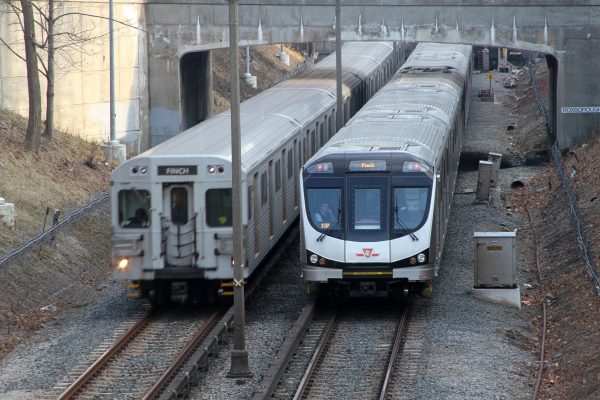On Tuesday, city councillor Gord Perks posted a Twitter thread that our editors thought would be both insightful and entertaining for our readers.
1. Transit. Politics. Yup, gonna go there.
— Gord Perks (@gordperks) February 27, 2018
2. You may have seen recent coverage (particularly in The Star) of Go stations being added at huge costs with a negative impact on ridership. (That’s right some new stations would slow the trains, making the service worse & reducing risership).
— Gord Perks (@gordperks) February 27, 2018
3. Like you, I am horrified that a public agency would consider spending scarce public transit money to make things worse.
— Gord Perks (@gordperks) February 27, 2018
4. This of course is not a new phenomenon. Scarborough subway. Smart Track. Or further back Vaughn Subway and Sheppard Subway. Even further (hello @SwanBoatSteve) the original Scarborough RT.
— Gord Perks (@gordperks) February 27, 2018
5. Many respond to this by saying we have to take the politics out of transit planning. I don’t think that’s right.
— Gord Perks (@gordperks) February 27, 2018
6. First, suppose that we set up an agency of experts and let them decide. THIS IS HOW WE GOT METROLINX IN THE FIRST PLACE. Someone picks the experts. Someone gives them funding and a mission. Someone pays them. When public money is at stake that has to be the elected government
— Gord Perks (@gordperks) February 27, 2018
7. Second, in my experience, experts can get it wrong. Part of the reason we hold public meetings is that people who use a service, or live in place, or will be effected by a proposal know things about the service, place, or proposal that a professional expert won’t know.
— Gord Perks (@gordperks) February 27, 2018
8. Third, democracy. This is the hard one. The goals of a society are not technical. If we all want to sit in traffic, polluting the air so we die younger, and changing the climate in disastrous ways, then that’s our right.
— Gord Perks (@gordperks) February 27, 2018
9. Fortunately we don’t all want to do that. But, there are many choices we do make that are about values and not about numbers. That’s a good thing.
— Gord Perks (@gordperks) February 27, 2018
10. Here’s my sense of how it should work. We should set broad social goals politically, democratically. We should hire people with expertise to sit down with the effected parties to think through options of achieving the goal.
— Gord Perks (@gordperks) February 27, 2018
11. The experts should provide advice PUBLICLY. Elected governments should deliberate on the advice PUBLICLY and decide. In this way each actor in the process is accountable for their part.
— Gord Perks (@gordperks) February 27, 2018
12. If i take a position that’s at odds with expert advice I take great pains to explain why. Perhaps I have different goals. Perhaps give more weight to certain stakeholders. As long as you can see the advice I am working from and hear my reasoning, I am doing my job.
— Gord Perks (@gordperks) February 27, 2018
13. It’s only if I put my thumb on the scale and change the advice I get OUT OF PUBLIC VIEW that we have a problem. When that happens I can pass the buck and I can hide my motivations.
— Gord Perks (@gordperks) February 27, 2018
13. Our problem with transit planning isn’t too much politics, it’s too little. Open debate, transparency to the public, accountability, advocacy, values. We need more of this. Without politics there is only authority. That’s what I think. – end
— Gord Perks (@gordperks) February 27, 2018
Gord Perks is city councillor for Parkdale-High Park. Follow him at @gordperks. This thread originally appeared on Twitter on February 27.



4 comments
I take a degree of issue with the *semantics* of “politics” as espoused by Cnclr Perks. In a nation like Switzerland with a Cantonal form of political accountancy, and referendums conducted on any major issue, yes, by all means put it all up for discussion. The Swiss gladly participate in their directly accountable system.
Toronto? Errr…not so much. Don’t make me explain why, and even if there was a rational explanation to be had, just take a look at City Council, and try not to hurl…
I think it is quite disingenuous of Perks to take the study results at face value (tweets 2 and 3). For one, these calculations were based on the current fare structure, current diesel trains, current frequency. This would be entirely different with electrified RER running every fifteen minutes in both directions — which is Metrolinx’s stated goal.
Does he honestly think that a single commuter in Barrie will decide not to take the GO train when it has an added stop at Bloor Street?
I understand the skepticism about “Smart Track” as it was advertised by Tory in the last election, but this poo-pooing of RER is tantamount to throwing a litter of puppies out with the proverbial bathwater. Please look at transit in large East Asian or Central European cities and it should be obvious that improving the connectability between GO and TTC and making GO more attractive for travel within Toronto are important and necessary steps towards solving the transit disaster that is the GTA.
Gord’s done excellent work on monitoring and criticizing the too-many follies of this Clowncil on the transit file, and he is almost alone in truly getting the magnitude of harms and change of the climate crisis as well. However, sadly and frustratingly, there’s a major blind spot in accepting inferior half-moves towards improved east-west transit from the Parkdale area from the pinch point at base of High Park in to the core, which is and has been a most logical place for robust transit from before the Queen St. subway. The 1985 version of the Downtown Relief Line used Front St. and its Extension just at the north side of the railtracks over to Dufferin, and then got further west/NW by other options.
We’ve really needed faster sub-regional robust transit to relieve King/Queen/Bloor/GO and the Gardiner/Lakeshore: it has to be speedier than a milk run too, and get to real destinations, so a Front St. alignment is smart. Gord did help quash the road-based Front St. Extension but didn’t do the extra thing of advocating for transit instead, and the local road lived, and now is approved with his and Councillor Layton’s support, though it’s right where a DRL was to go. So he’s supporting a new road in the core where transit should be, and not calling for transit either, even though a new variant of a DRL could help a lot I think.
The new variant is to compromise our thinking ahead of it being compromised by the Clowncil – so can we put through a reversible and thus one-lane transitway on the DRL route (including the bank of land with ads) that at least provides some faster transit for Etobicokians, some Parkdalians and the somewhat isolated people of Liberty Village? It might have been possible, but the core reps don’t really want to improve transit in a meaningful and moderate-cost way it seems. Only a full subway might do because that’s more money and jobs for construction interests?
I know it’s a complex area, but surely after about 15 years of having this clear need and chance for faster transit somewhat on the agenda, there should be a real push from the local Councillor to be doing faster sub-regional TTC transit? The need and chance has certainly been there; and less-so the local Councillors, and sadly, because no robust transit plan where most cities would put them, it means it may be another wasted rare-odds in this greenhouse century corridor missed.
The pinch point at the base of High Park is the most logical place to begin a RoW in to the core, and a surface option, while not a subway in the right place, is the right thing as we’ve blown the easy times over the decades; sigh.
Gord Perks wrote:
“If we all want to sit in traffic, polluting the air so we die younger, and changing the climate in disastrous ways, then that’s our right.”
Kevin’s comment:
No, it is not. Nobody has a right to launch a fine particle lethal cancer poison attack against myself and my children. The City of Toronto’s public health department reports that motor vehicle operators poison and kill 280 people in Toronto every year. They also poison and injure another 1,090 people so seriously that they have to be hospitalized. See:
https://www.toronto.ca/wp-content/uploads/2017/11/9190-tph-Air-Pollution-Burden-of-Illness-2014.pdf
In 2007, Toronto Public Health determined that the financial cost due to people being poisoned and killed or injured by motor vehicle operators in Toronto is a whopping $2.2 billion per year. And that children and the elderly are most vulnerable to being killed by motor vehicle operators. See:
https://www.toronto.ca/legdocs/mmis/2007/hl/bgrd/backgroundfile-8046.pdf
I have Zero Tolerance of these vicious child poisoning, child killing car drivers continuing to launch their fine particle lethal cancer poison attacks against myself and my dear wife and my precious children. Let me say that again: ZERO TOLERANCE.